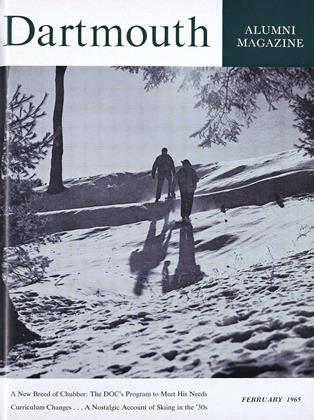A recent news story noted that Metro-Goldwyn-Mayer was negotiating for the screen rights to a new book, The MollyMaguires. What gave the article its incongruent twist was that the book was written by a Tuck School professor of business administration and published by the Harvard University Press. And far from being a romance with an Irish heroine, as the title and Hollywood's interest might indicate, it was a history of an Irish secret society in the labor troubles of the Pennsylvania anthracite fields in the 1870's. All of which needs a bit of explaining.
Five years ago Prof. Wayne G. Broehl was seeking data on the labor difficulties in Pennsylvania's coal fields of the 1870's. He planned to use the material in a three-minute section in one lecture in his course, Business and Society. He began his research at Baker Library .. . and he was hooked.
The story was a fascinating example of early American labor unionism. In addition, it had ethnic, political and religious overtones since many mine own- ers were English Protestants and the miners Irish-Catholic immigrants who brought from Europe all the bitterness engendered by the religious and tenant-owner strife there. And finally, there was the story of James McParlan, a Pinkerton detective hired by the railroads and mine owners to infiltrate the secret society and whose testimony resulted in the hanging of some 20 members of the society.
Professor Broehl soon exhausted the materials in Baker and had more than enough material for the lecture. But he couldn't let go. He wrote to the Pinkerton Agency and the Reading Railroad, a major owner of mining properties in those days. His timing was good. Both had kept their files closed until passions cooled. Many sensationalized accounts had been written and perhaps the definitive story could now be told by a dispassionate scholar. The agency and the railroad agreed to open their files.
And the files were a scholar's treasure trove. They contained Agent McParlan's regular handwritten reports and expense accounts and Allen Pinkerton's handwritten notebooks about the case. These plus other contemporary accounts and records in Pennsylvania provided the American part of the story.
But its roots were in Ireland in the economic, ethnic, religious, and political turmoil in the unhappy land where the "Mollies" had originated. Its origins were a fundamental part of the story. And so Professor Broehl went to Ireland.
His investigations in America were supported by a grant from the Alfred P. Sloan Foundation. He applied for and received funds for his work in Dublin from the Irish government under an education exchange agreement with the United States.
The year in Dublin, where he also lectured in American history at University College, proved equally fruitful. In the 11th century Dublin Castle, which houses the Public Records Office and the State Paper Office, he found British police reports and Irish documents piled high on shelves of the castle's turrets. From these he was able to trace the origins of the secret society.
With his research completed, there remained the compiling, writing, and evaluating. Professor Broehl evaluates the "Mollies" story in the concluding paragraph of his book like this: "Why has the Molly Maguire story remained so popular? ... It struck deeply at the fundamental issues of 19th century life and helped to shape the character of the nation in this critical period. But there is another basic reason, too. Given all the economic, ethnic, religious and political dimension, the Molly Maguire saga was, finally, a personal story. Personal success ...personal failure ... personal virtues: courage, tenacity, boldness. Personal weakness: drinking, hating, informing, killing. The deepest of human passions were involved here; these passions finally determined the story. And it was quite a story."
Prof. Wayne G. Broehl
 View Full Issue
View Full Issue
More From This Issue
-
 Feature
FeatureA NEW BREED OF CHUBBER
February 1965 By JOHN ALDEN THAYER JR. '65 -
 Feature
Feature"It Was Quiet, Serene, and Beautiful"
February 1965 By GEORGE R. ANDREWS '37 -
 Feature
FeatureBusiness Still Draws Its Share of Graduates
February 1965 By ADDISON L. WINSHIP '42 -
 Feature
FeatureFreshman-Sophomore Curriculum Revised
February 1965 -
 Article
ArticleTHE UNDERGRADUATE CHAIR
February 1965 By BOB WILDAU '65 -
 Article
ArticleDartmouth's Story Superbly Told
February 1965 By ALBERT I. DICKERSON '30
GEORGE O'CONNELL
-
 Article
ArticleTHE FACULTY
October 1961 By GEORGE O'CONNELL -
 Article
ArticleTHE FACULTY
June 1962 By GEORGE O'CONNELL -
 Article
ArticleTHE FACULTY
NOVEMBER 1963 By GEORGE O'CONNELL -
 Article
ArticleThe Faculty
DECEMBER 1965 By GEORGE O'CONNELL -
 Article
ArticleThe Faculty
FEBRUARY 1966 By GEORGE O'CONNELL -
 Cover Story
Cover StoryThe Dartmouth Disease
SEPTEMBER 1983 By George O'Connell







